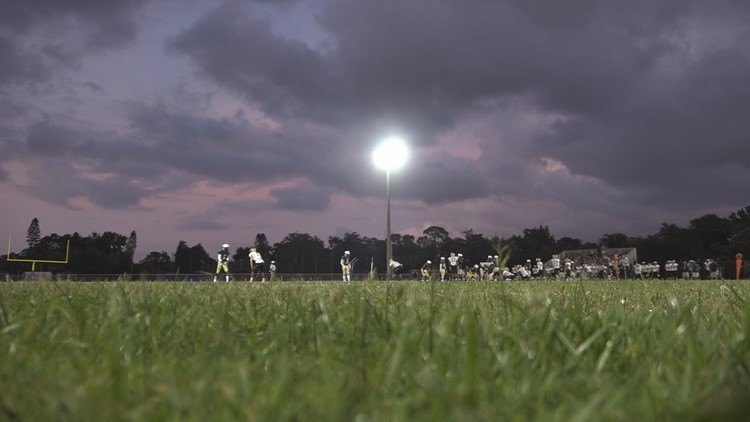ST. PETERSBURG, Fla. -- Every Friday night all across the country, parents hold their breath as more than a million kids suit up and hit the football field.
Concern over concussions has been growing for years, and it might be a factor in fewer young people playing football. There’s still a lot we don’t know about concussions -- a brain injury, primarily brought on a violent blow to the head -- though we could know more sooner rather than later.
There’s a major study underway in the Tampa Bay area to help us learn more about the injuries, not far from where a proud father watches his son play football despite himself dealing with a disease brought on by so many hits so many years ago.
Multiple concussions lead to Parkinson's
"To be a football player, I get choked up.… It’s a big deal," said Vincent Wright, who played high school and college football. Wright attributes all the hits he took on the field for giving him early-onset Parkinson’s disease.
Even still, on Friday nights, he can’t wait to watch his son Payton play for the Blue Jackets of Admiral Farragut Academy in St. Petersburg.
"I can’t sleep past 6 a.m. on game day. I have to take almost double my medication by the time the game gets here because my adrenaline is running so high," Wright said. "Somebody may look at me and say, ‘How could you suffer with Parkinson’s, knowing how it happened, and allow him to play football?’
"To me, it’s very simple because 30 years ago, we didn’t know what concussions were all about."
But thanks to Payton and 92 other local high school athletes, new data on hits and concussions are being recorded every time he takes the field.
Tackling concussions
“We’re learning more and more about concussion every day, and there’s a lot that we don’t know,” said Dr. Patrick Mularoni, Medical Director of the Sports Medicine Division at Johns Hopkins All Children’s Hospital in St. Petersburg.
Mularoni is one of the lead researchers studying the effects of concussive and sub-concussive hits on the brains of high school athletes. The three-year study involves athletes wearing a monitor, which records data on the speed and force of each hit, as well as what direction the hit comes from.
“We’re actually looking at two things: We’re looking at those individuals that do sustain a concussion during the study and looking at the type of hit they took and looking at how they’re doing a year later and two years later,” Mularoni said.
“We’re trying to learn more about those kids that do get concussions, but more so we’re trying to learn more about the kids that don’t get concussions to determine whether or not it’s actually safe to be playing if you’re not getting concussions.”
The three-year study also includes athletes playing hockey and women’s soccer, and the data will eventually be published in national medical journals.
“There’s a lot of excitement,” said Jared Middleton, a senior on the Admiral Farragut football team and also a participant in the study. Every game, every practice, he wears his data-recording mouth guard and he loves to dish out hits.
“I’m ready to just let it unload and make somebody else have to wear the mouthpiece, see if we can get some data from them,” he added, with a smile on his face.
But while Middleton jokes about concussions, brain injuries are no laughing matter. Meanwhile, as Middleton’s teammate Payton Wright sees the effect football has had on his father, it’s not going to stop him from playing the game they both love.
“Back then, they didn’t have a lot of protection, they didn’t have a lot of studies, they were not studying this at all,” he said. “I’ve never been scared of football and it’s never bothered me, but I think about it sometimes and I’m like, ‘If it does happen, I can’t change the fact that it happened, but in the future at least we’ll get data to make it better.'”
Related Stories:



